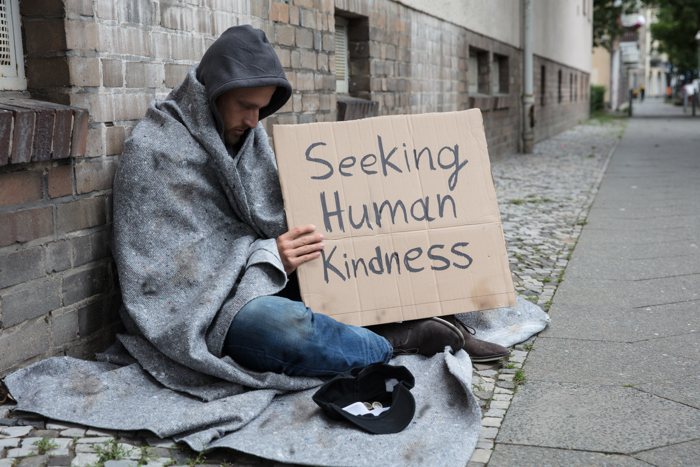
With the news of the government having declared a £100M plan to combat rough sleeping by 2027, via a three-pronged approach of prevention, intervention and recovery, Fasthomes.org investigated further into this deep-rooted societal problem. According to recent statistics released by Gov.uk, homelessness is at an all-time high with more than 4,721 people reported to be sleeping rough, and an unprecedented 155,930 families without a permanent place to call home. Shockingly, only a small fraction is considered a priority in need, but what does this all mean? Due to the widespread problem and lack of affordable housing, those in need of housing support and accommodation are categorised into eligibility, priority and whether they are considered “unintentionally homeless”.
This is where the issue becomes several shades of grey, as the legal definition of the unintentionally homeless states the individual could not have done, or not done something to prevent homelessness. This could include financial, illness or job-related problems, which considerably varies dependant on the individual's circumstances. Current figures from the beginning of this year suggests there are around 58,710 households that the council agree fall into this category. However, a recent report carried out by the homeless charity Shelter, discovered that more than 78,930 families were awaiting a temporary housing solution, which is a staggering 64% rise since 2010.
The most common temporary housing solution being a hostel, or in worst cases a B&B, is what most would hope to be a short period of time before a solution becomes available. However, with waiting lists extending and a severe lack of suitable housing, this enormous problem seems to be spiralling out of control. Sadly, not even factoring in those of which are considered “intentionally homeless” or not of top priority, the largest victim to this category being single males without children.
Despite the government’s latest fund seeming to be a positive step in the right direction, charities such as Crisis, Homeless Link and St Mungo’s have reportedly expressed their concerns, simply funding a problem will not provide a sufficient means to an end. Polly Neate, chief executive of Shelter, has stated:
"But let's be clear, this is a step forward and not a total fix for homelessness. We still need to tackle the chronic lack of genuinely affordable homes, deep instability of renting and problems with housing benefit that are leaving so many without a home."
Adopting a strategic approach to understanding the vast causes and preventing homelessness and providing sufficient housing support in the first place will be key to stopping the enormous problem from spiralling further.
New initiatives such as the Homelessness Reduction Act, which was introduced in April this year, entitles people considered threatened with homelessness 56 days instead of the mere 28 before the are likely to become homeless, help and assistance from their local councils to avert crisis. But with the impending and uncertain impact of Brexit, a collaborative report between Homeless Link and Crisis implies the national agenda for ending homelessness must remain a priority, suggesting policies, if not handled carefully, could significantly impact the crisis in a negative way. However, the report also sheds light on the positive opportunity Brexit could provide, stating it should help shape a bolder and radical policy on tackling homelessness. Perhaps the most significant impact in conjunction with the government’s latest approach is awareness. With homelessness showing no signs of disappearing overnight, this is an issue that needs to become of a wider concern, resulting in a shift in the public’s general view of the homeless and the action that can be taken to help those in need. This is battle that cannot be fought alone, with charities across the UK working hard to tackle the issue. Some of the ways in which this can be done is by offering specific and specialist services to cater to the individual in need, providing access to temporary accommodation, housing and legal advice, employment and education support, financial and benefit advice/support and help with substance and alcohol dependency and or abuse.

Photo credit: SewCream/shutterstock
The most important thing you can do is offer a friendly face, a warm smile and a hello. The homeless are most vulnerable and isolated in society, therefore the simplest way to help is to speak up, as this small gesture can make a larger difference than you may realise. You can also get in touch with StreetLink, sending an alert through its website, or by calling 0300 500 0914. It is vital that you provide the location of the rough sleeper and or details of the individual that may help find them. This information is then forwarded on to the local authority or charities within the area. Alternatively, you can get in touch with a charity, simply donate, or volunteer your time to help those when they need it most by fundraising and campaigning. Each charities approach is different, but below are some of the top charities fighting to beat homelessness:
ST MUNGOS
St Mungo’s have developed a recovery-based approach, where by the individual’s unique skills and strengths are at the centre of their recovery. With the help of St Mungo’s outreach team, a strategy is put into motion to get someone off of the streets and back to being an active member of society.
https://www.mungos.org/
Phone: 020 3856 6068
Email: info@mungos.org
Charity Number: 1149085
St Mungo's, 3 Thomas More Square, Tower Hill, London E1W 1YW.
HOMELESS LINK
Homeless Link is a national membership charity for organisations working directly with the homeless, aiming to make services better and campaign for change.
https://www.homeless.org.uk/
Phone: 020 7840 4430
Email: info@homelesslink.org.uk
Charity Number: 1089173
Homeless Link, Minories House, 2-5 Minories, London EC3N 1BJ
CRISIS
Crisis work directly with thousands of homeless people every year, providing support and advice for those in need. Adapting their approach to each individual dependant on their circumstances, varying from finding a home, developing new skills, finding a job or health and wellbeing support.
https://www.crisis.org.uk
Phone: 0300 636 1967
Email: enquiries@crisis.org.uk
Charity Number: 1082947
Crisis, 66 Commercial Street, London, E1 6LT
SHELTER
Shelter helps millions of people every year struggling with housing and accommodation issues and homelessness, through its support and legal services and advice. Actively campaigning for change so that one day, no one will need their help.
https://england.shelter.org.uk
Phone: 0300 330 1234
Email: Into@shelter.org.uk
Charity Number: 263710
Shelter, 88 Old Street, London, EC1V 9HU
Feature image credit: Andrew Popov/shutterstock
